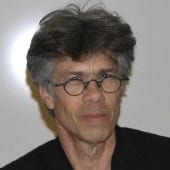In these lectures Professor Sanderson will introduce the Tantrāloka of Abhinavagupta (fl. c. 975–1025), that author’s monumental exposition of the Śaiva Tantras from the standpoint of the Śākta Śaiva tradition known as the Trika and the philosophical non-dualism of the Pratyabhijñā texts, contextualizing his undertaking within the religious developments of the early medieval period. He will then translate and explain Abhinavagupta’s own introduction to his work (1.22–106), in which he sets out the fundamentals of his system.
Prof. Alexis Sanderson began his Indological career as a student of Sanskrit at Oxford in 1969, studied the Kashmirian Śaiva literature in Kashmir with the Śaiva Guru Swami Lakshman Joo from 1971 to 1977. He was Associate Professor (University Lecturer) of Sanskrit at Oxford and a Fellow of Wolfson College from 1977 to 1992 and then the Spalding Professor of Eastern Religions and Ethics at Oxford and a Fellow of All Souls College from 1992 to 2015. From 2015 to the present he has been the Academic Director of the Institute for Śaiva and Tantric Studies in Portland, Oregon, where he is preparing a critical edition of the Tantrāloka with a translation and commentary. His field is early medieval religion in India and Southeast Asia, focusing on the history of Śaivism, its relations with the state, and its influence on Buddhism and Vaishnavism.

 Prof. David G. White is the J. F. Rowny Professor of Comparative Religions at the University of California, Santa Barbara, where he has been teaching since 1996. Prior to coming to Santa Barbara, he taught at the University of Virginia between 1986 and 1996. There, he founded the University of Virginia Study Abroad Program in Jodhpur, India in 1994. White is the sole foreign scholar to have ever been admitted to the Centre d’Études de l’Inde et de l’Asie du Sud in Paris, France, where he has been an active Research Fellow since 1992. His current research interest concerns contacts and exchanges in matters of demonology. Prof. White’s book publications include The Yoga Sutra of Patanjali (Princeton University Press, 2014), Yoga in Practice (Princeton University Press, 2012), Sinister Yogis (University Press of Chicago, 2009), Kiss of the Yogini: “Tantric Sex” in its South Asian Context (University Press of Chicago, 2003), The Alchemy Body: Siddha Traditions in Medieval India (University Press of Chicago, 1996).
Prof. David G. White is the J. F. Rowny Professor of Comparative Religions at the University of California, Santa Barbara, where he has been teaching since 1996. Prior to coming to Santa Barbara, he taught at the University of Virginia between 1986 and 1996. There, he founded the University of Virginia Study Abroad Program in Jodhpur, India in 1994. White is the sole foreign scholar to have ever been admitted to the Centre d’Études de l’Inde et de l’Asie du Sud in Paris, France, where he has been an active Research Fellow since 1992. His current research interest concerns contacts and exchanges in matters of demonology. Prof. White’s book publications include The Yoga Sutra of Patanjali (Princeton University Press, 2014), Yoga in Practice (Princeton University Press, 2012), Sinister Yogis (University Press of Chicago, 2009), Kiss of the Yogini: “Tantric Sex” in its South Asian Context (University Press of Chicago, 2003), The Alchemy Body: Siddha Traditions in Medieval India (University Press of Chicago, 1996).